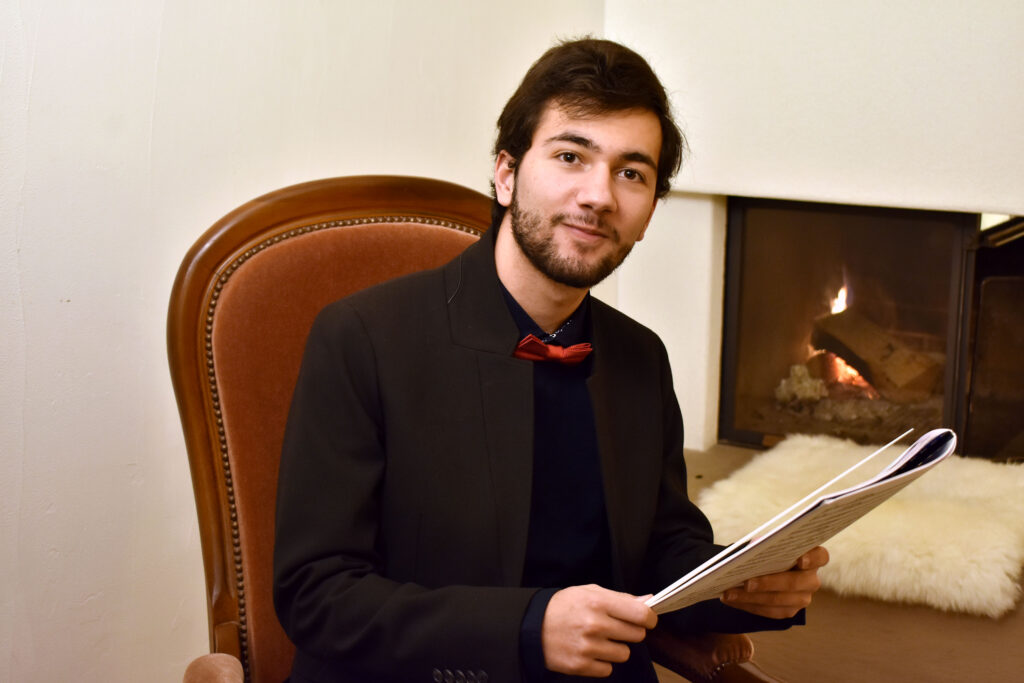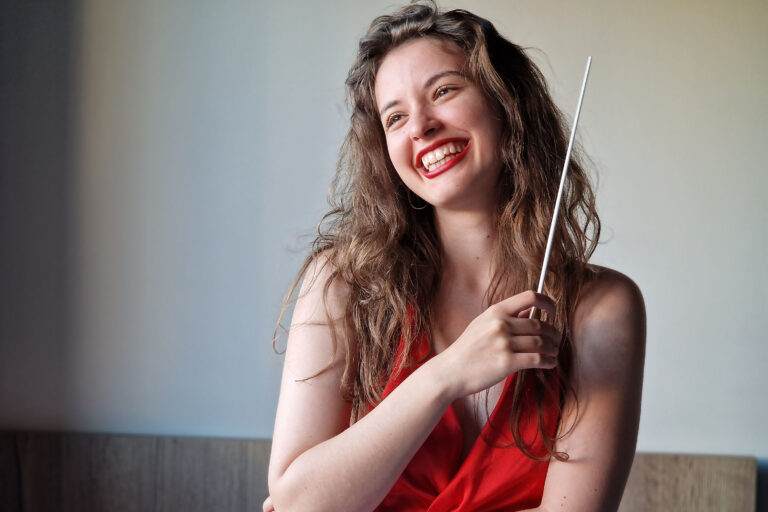Up until 2019, Théo Rossier, a cornetist and trumpeter from Vaud who was born in 2002, had been composing songs without any corresponding training. He then took his first harmony courses at the Lausanne Conservatory while conducting wind ensembles. As early as 2021, his work “Celui qui chuchotait dans les ténèbres” was selected by the Lausanne Chamber Orchestra to be included in a promotion project for Swiss composers. The idea for this piece in three movements came to him when he read H.P. Lovecraft’s “The Whisperer in Darkness”. “But I didn’t just want to describe the short story musically, but rather what the title evoked in me.”
Thematic connections
In 2022, Théo Rossier won first prize in the European Composition Competition for Brass Bands with the work “Stendhalʼs Syndrome”. The title of the piece, which premièred at the town hall in Birmingham, is his reference to a number of psychosomatic disorders that can occur when people are overstimulated by works of art. Théo Rossier thought of works by M. C. Escher “with their impossible figures and surface fillings that fascinate and hypnotise as soon as you look at them.” Since successfully completing his commercial vocational baccalaureate in the autumn of 2022, he has been studying composition with Xavier Dayer at the Bern University of the Arts.
Asked about his preferences and influences, Théo Rossier explains that he particularly likes modern music, “especially that of composers such as Olivier Messiaen and Igor Stravinsky”. But he also finds the work of Johann Sebastian Bach “incredible”. He also emphasises that he hasn’t written many pieces and not really developed a mature style of his own yet. “When people listen to my music, they usually say this reminds them of this or that composer – and I think that’s okay. But of course, I’m going to try to develop my own style.”
Advice from the mentor
The commission from Murten Classics means a lot to Théo Rossier, because it is his first commissioned composition and the collaboration with an orchestra represents a great opportunity for him. Since he likes to ground his compositions thematically, the reference to the festival theme “Stories – Histoires” was easy for him. “Yes, I do love stories and want to create a link to ancient Greece which was a great era, with my piece ‘Satyrus’.” He also thinks that the literary style of Greek comedy was interesting and drew inspiration from it, especially the mythological hybrid being of the satyr.
Before Théo Rossier began composing in October 2022, he considered “what emotionality I would like to evoke during the performance of the work.” Then he created the harmonic concept along with melodies and developed a plan of how he wanted to build the piece. By March 2023, he had completed a first version of the score and submitted it to his mentor Daniel Schnyder. The latter then gave him initial feedback. “He indicated to me, for instance, that one part was too complicated to read. Or he recommended that I could add more instruments at another point. However, he also noted that I had once not applied the enharmonics logically or that the rhythm in a passage was too hard. He also recommended that I should listen to a particular piece.”
Unconventional instruction for the performing artists
In April, Théo Rossier revised the score for the first time according to Daniel Schnyder’s input. As with composing, the computer helped him here, too, because he could try out different versions. “It’s not the perfect solution, though, because I can’t hear the balance between the instruments the way it will be when the orchestra is performing. But it’s good to get a first impression, also to be able to assess whether, say, a part seems too long.”
At the premiere, the pieces by the “Young Composers” will be framed by traditional works by Archangelo Corelli and Ernest Bloch. Théo Rossier knows the two works – and was inspired by them “just a little bit”. Not more than that, because they are “clearly more traditional than my piece.” He said his piece will come across “like a wild dance” in keeping with the titular figure of the satyr. “I also use unusual instruments like a wine bottle,” he explains ambiguously.
So what does that mean in concrete terms? “The percussionist uses the sound of a bottle, and he only uses it once (laughs). Well, it’s about the sound of a bottle shattering to smithereens.” The question is how he notates something like that in the score. “In it, there is an instruction to the percussionist: ‘break the bottle’.” He also wants to give the other musicians some room for interpretation. But one thing is important to Théo Rossier above all: “I hope that at the concert everyone will enjoy my piece.”
Youtube channel of Théo Rossier: www.youtube.com/@theorossier166
Jubilee concert celebrating 100 years of SUISA at the Murten Classics Festival 2023
Last year, Murten Classics commissioned four young Swiss talents, Pascal Bachmann (*2006), Joëlle Nager (*2000), Théo Rossier (*2002) and Arseniy Shkaptsov (*1993) to each write a composition of a maximum of eight minutes for string orchestra, piano, harp and two percussion instruments on the festival theme “Stories – Histoires”. The four “Young Composers” were selected by conductor Christoph-Mathias Mueller, who is also artistic director of Murten Classics, and “Senior Composer” Daniel Schnyder. The latter accompanies the “Young Composers” during the composition process as a mentor. Born in Zurich in 1961 and living in New York City since 1992, the saxophonist and flutist is considered one of the most versatile composers of his generation.
A public dress rehearsal with talks will be held on Saturday, 26 August, at 2pm in the German Church of Murten under the title “Talking from the Workshop”. A ticket to the concert on Sunday, 27 August, entitles to this public rehearsal in the presence of the composer and the composers. The concert with the world premieres begins on Sunday at 8 pm in the idyllic castle courtyard. Arcangelo Corelli’s “Concerto grosso op. 6, no. 4” and Ernest Bloch’s “Concerto grosso no. 1” will provide the framework for the works of the young composers. The programme will be interpreted by the Hilaris Chamber Orchestra, which is extended by Isabel Goller (harp), Kiril Zvegintsov (piano), Jens Ruland (percussion) and João Carlos Pacheco (percussion); Christoph-Mathias Mueller will be the conductor.
Tickets are available from 1 June, more info: www.murtenclassics.ch




